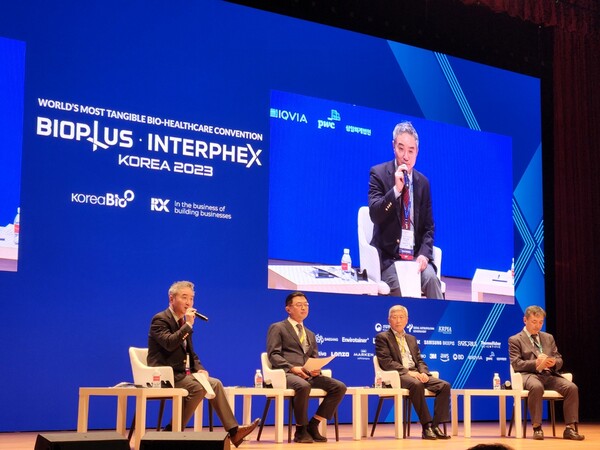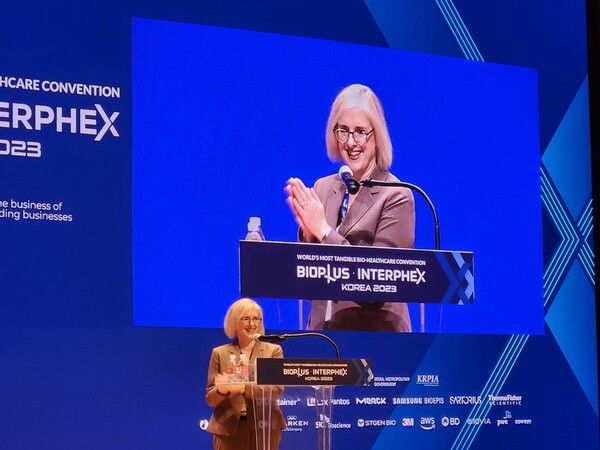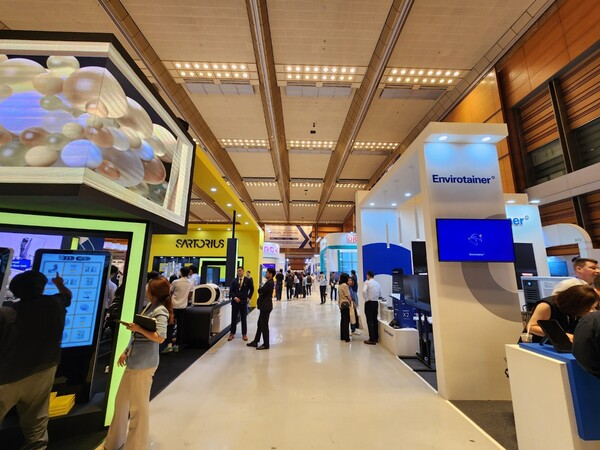Experienced CEOs from Korean pharmaceutical companies emphasized the need for three-way collaboration between early-stage biotechs, domestic pharmaceutical companies, and multinational drugmakers.
Their comments came in the first keynote session at Bioplus-Interphex 2023 in Coex, Seoul, a global comprehensive bio convention co-hosted by the Korea BIO and RX Korea.
The event kicked off on Wednesday and runs through Friday to highlight the latest innovations and strategies to overcome common difficulties within the bioindustry.
Highlighting the conference theme of revamping Korea’s biotech industry, Yuhan Corp. R&D President Kim Yeul-hong outlined a three-way collaboration between early-stage biotechs, domestic pharma, and global pharma.

"Early-stage biotechs should play the role of conducting discovery studies and providing enabling platforms, while domestic pharmaceutical and biotech companies can develop the human proof of concept studies and then license out to global pharma for late-stage development," he said.
Kim elaborated that companies need to focus on their strengths and find strong partners to complement the other areas where the company might fall short.
Yuhan excels in delivering preclinical-clinical translational research in the middle of the drug development pipeline which includes candidate discovery, and early stage phase 1/2 clinical trials to enable swift transitions from the pre-clinical to the clinical stage, according to Kim.
However, he acknowledged two “death valleys” for the company regarding technology optimization which is critical at the beginning of pipeline development and another in late-phase clinical development.
Leaning on his experience from the company’s recently launched Leclaza (ingredient: lazertinib) as a first-line lung cancer treatment in Korea, Kim highlighted active collaboration with academia and bio ventures through Yuhan’s Innovation program to nurture talent to overcome the lack of technology optimization within the company.
He noted the importance of striking the right balance in licensing out deals with global biopharma companies such as Yuhan’s licensing-out deal with Janssen for Leclaza clinical trials in the U.S.
Kim was also joined on stage by Korea Investment Partners Management CEO Hwang Mahn-soon who emphasized the importance of boosting employee morale to prevent the tarnishing of the reputation of recently listed Korean companies.
“Robust pipelines and proper functioning boards are key to becoming a global bio company but these things take time to develop," said Hwang.
Internal employee conflict, which leads to the spreading of self-destructive rumors, needs to be prevented to stop derailing the progress, of newly listed companies, he added.
The first technical session was also well attended with participants crowding the room to learn more about the latest innovations in proteolysis-targeting chimera (PROTAC) and antibody drug conjugate (ADC) technologies.
LegoChem Biosciences CEO Kim Yong-zu kicked off the session highlighting the importance of linkers in delivering ADC technologies to the targetted site.
“Everyone in the ADC field now is engaged in site-specific conjugation so this is no longer a novel pursuit,” Kim said. “I think the linkers in ADC technologies play the most important role in increasing the likelihood of the therapeutic dose reaching the intended site.”
He also noted the increasing diversity in the field of ADCs. He specifically pinpointed the immuno-oncology payloads from antibody-immune conjugates (AIC) such as TLR agonists, sting agonists, and immune cytokines as keys to revolutionizing the ADC field in the upcoming years.

Meanwhile, at the opening ceremony, Nancy Travis, Vice President of International Affairs at the Biotechnology Innovation Organization (BIO) in the U.S. mentioned the overlapping themes in the BIO International Convention in Boston last month and Bioplus-Interphex this year in revamping the industry's vitality.
“There is room for the U.S. to learn more from Korea in terms of public-private partnerships and likewise for Korea to learn from the U.S. innovative bioclusters and what it takes to make it sustainable," she said.
According to Korea BIO, this year amassed 400 booths in the exhibition hall including 200 companies from 14 countries around the world. Some of the foreign biocompanies represented at Bioplus-Interphex this year include the U.S., China, the U.K., Australia, and Latvia.

Related articles
- Bioplus-Interphex Korea 2023 will seek solutions for revamping Korea's bioindustry
- Korea BIO, US BIO to strengthen bioeconomy partnership
- ‘TnpB protein, a new tool in CRISPR-Cas gene editing’
- Foreign biotech companies seek Korean partnerships at BIX 2022
- 'FDA Project Optimus set to affect all cancer drug developers, not just in the U.S.'
- Bioplus-Interphex 2023: Korea launches business council to boost microbiome competitiveness

